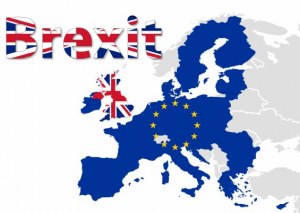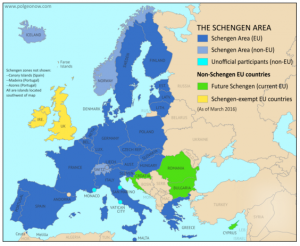
Britain America First! ??? When does patriotism evolve into hate and bigotry? America First! New York First! Rochester First! Family First! Me First! Where does it stop? Cheering for our favorite team or expressing pride in our nation must stop short of hating the other team or endorsing formal discrimination in favor of what is deemed “ours.” Trump’s proposed ban on Muslim immigration would soon morph into a ban on American-born Muslims, to a ban on Islam itself. Is that not a small step away from a descent into warring tribes, each convinced that they alone deserve special treatment?

Next Thursday the Brits will decide whether or not they should remain in the European Union. Dubbed “Brexit,” the referendum puts the United Kingdom’s European identity to the test. The Economist/YouGov poll scores the contest at a dead heat—42% or 44% on either side with 10% on the fence. My forecast—the status quo wins when the poll is even. Brexit is dead. I think.
 The poll reveals some big divisions: the young want to stay while the old want to leave; the rich want to stay while the poor want to leave; Scotland wants to stay while Wales wants to leave. Liberal Labor wants to stay while Conservative Tories want to leave.
The poll reveals some big divisions: the young want to stay while the old want to leave; the rich want to stay while the poor want to leave; Scotland wants to stay while Wales wants to leave. Liberal Labor wants to stay while Conservative Tories want to leave.
What’s best? Economists argue that economic integration is efficient; nearly all, from the Bank of England to independent pundits, predict some loss of national income from re-erecting a virtual wall in the English Channel. The U.K. has never fully embraced the EU. They prefer the pound sterling to the Euro; Britain isn’t part of the passport-free Schengen Area; many policies remain independent of other EU members. Brexit supporters want to claw back control they believe has been lost and end payments to support the EU’s sprawling Brussels bureaucracy. Either they don’t think they’ll lose or they’re willing to trade some prosperity for sovereignty. 
We’ve been having our own “Brexit” debate during this chaotic primary season. Closer integration with the world economy has been on trial on the left and the right. Both Trump and Sanders promise a better world without, well, the world. While their rhetoric differs, the message is the same: Trade has stolen jobs from American workers. As both oppose agreements that mutually reduce barriers to trade with other nations (like the North American Free Trade Agreement and the Trans-Pacific Partnership), they apparently support raising these barriers anew and trading less.
The case for free trade bears repeating. Economist Greg Mankiw offers an illustration, adapted here. It’s February in Rochester and 2 feet of snow fell overnight. You’d happily pay $40 for someone to clear your driveway. The boy next door, currently captured by his Xbox, will put aside the game and shovel your driveway for anything over $20. So if you pay him $30 to shovel your driveway, you will both be better off by $10. That’s why we trade—both parties gain. 
Mankiw’s plot thickens: The girl across the street wants a new dress for a date and she’s short of cash. She comes over and offers to do the job for anything over $10. It’s a deal! You give her $15 and she’s $5 better off and you’re effectively up $25. The boy goes back to his Xbox, but he’s unhappy because he lost the chance to do better.
Think of the girl as a foreign competitor. Trump and Sanders seem to believe that we should hire the boy just because he lives on our side of the street. But wait—you have $25 left over from the snow bargain with the girl. As the boy next door is a math whiz, you hire him to tutor your daughter in algebra. He lost the shoveling gig but moved up the food chain as a knowledge worker. Now everybody’s happier.
Let’s complicate Mankiw’s fable. Adjacent neighborhoods have always had lots of boys and girls but there were walls and rules that prevented them from offering to shovel. Competition in the global economy now includes all of Southeast Asia, particularly China, the former nations of the Soviet Union and the Indian subcontinent, most of Latin America, etc. Oh, and many of them are better at math than the kid next door.
And the guy on the next block just invented a snow blower that only costs $50. After the 4th snow, you’re money ahead. “Sorry, kid! Do you do Windows?”
Trump wants trade—but he thinks we should treat other nations like he does contractors on his projects. If the girl will shovel for anything over $10, he’ll offer $10.01 and take nearly all the benefit (then he’ll claim she did a bad job and refuse to pay). For Sanders, the devil is the corporate middleman, the Donald Trumps who pay both the girl and boy less than they could. He insists that we can force a better bargain on business.
Trade can make everyone better off, but in the real world there are winners and losers. When we buy from China we lose manufacturing jobs—but we cut the cost of living for American consumers. Rochester lost farm jobs when New York City started buying cheaper wheat from Iowa, too. Let’s manage the negatives of trade, not cut it off. The Trade Adjustment Assistance program, supporting workers displaced by trade with training and job search services, gets mixed reviews. It deserves the attention of reformers plus stable and adequate funding. It is impossible to hold workers harmless from economic change due to trade, but we can take steps to help them manage the transition.
Just like the U.K., we’re better off in the world than outside it. We can go it alone but both sides of the transaction pay a price.